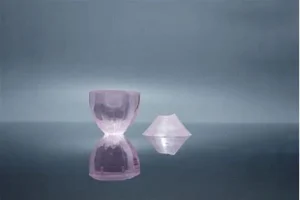In the dynamic and rapidly evolving realm of optical technology, terbium gallium garnet (TGG) consistently stands out due to its unique properties and diverse applications, especially in the fabrication of Faraday isolators. This comprehensive examination provides in-depth insights into the instrumental role of TGG crystals in revolutionizing Faraday isolators.
Understanding Terbium Gallium Garnet
An essential first step in our journey is a firm grasp of the basics. Terbium gallium garnet, also known as TGG, is a synthetic garnet-type crystal. Owing to its high Verdet constant, low absorption coefficient, and excellent thermal stability, TGG stands as a cornerstone material in various optical applications, most notably in Faraday isolators.
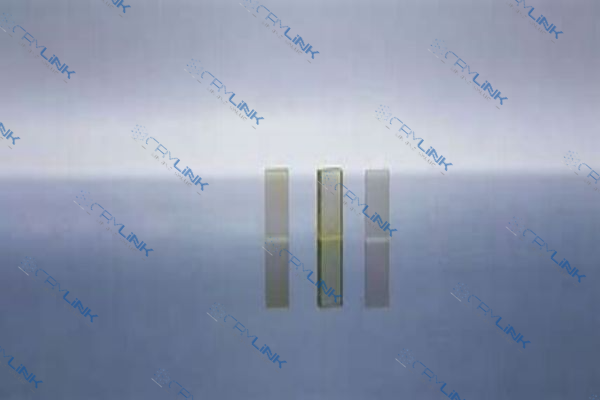
Distinctive Characteristics of TGG Crystals
What truly distinguishes TGG crystals are their unique properties that set them apart from alternative materials. The combination of a high Verdet constant (which measures the degree of rotation of the plane of polarization) and a low absorption coefficient at near-infrared wavelengths makes TGG an optimal choice for applications demanding a high degree of light polarization.
TGG’s Thermal Conductivity and Hardness
TGG also boasts impressive thermal conductivity and hardness. These properties contribute to its durability and effectiveness, especially in high-power laser systems where heat management is crucial.
The Intrinsic Role of TGG in Faraday Isolators
Having delved into the properties of TGG, it’s time to investigate its vital role in Faraday isolators, indispensable tools for preventing the damaging back reflection in laser systems.
What is a Faraday Isolator?
In the simplest terms, a Faraday isolator is an optical device that allows light to pass through in one direction while blocking it in the opposite direction. They are integral to high-powered laser systems to protect against potential damage or disruption from back reflections.
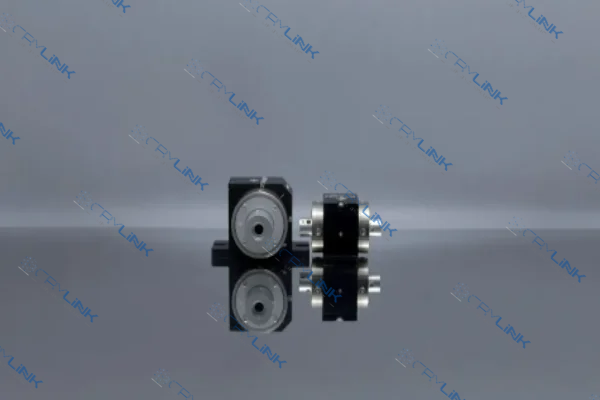
Faraday Effect: The Driving Principle
The Faraday effect, discovered by Michael Faraday in 1845, provides the foundational principle for Faraday isolators. When light passes through a material under the influence of a magnetic field, the plane of polarization of the light rotates. This rotation is linearly proportional to the intensity of the magnetic field and the path length through the material. This effect is harnessed in a Faraday isolator to control light propagation.
Construction and Operation of Faraday Isolators
A typical Faraday isolator comprises three essential components: an input polarizer, a magneto-optical material (such as TGG), and an output polarizer (also known as an analyzer). The input polarizer ensures that only light with a specific plane of polarization enters the isolator. This light then passes through the magneto-optical material, where it undergoes a 45-degree rotation under the influence of an applied magnetic field. The rotated light continues towards the output polarizer, which is oriented to match the rotated plane of polarization, thereby allowing the light to pass through.
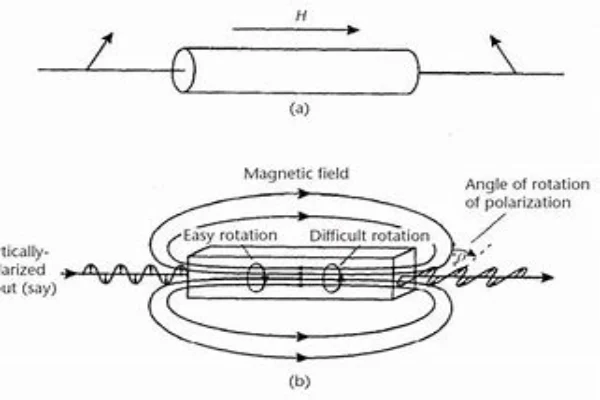
Protection Against Back Reflections
The true power of a Faraday isolator lies in its ability to protect laser systems from back reflections. If any reflected light enters the isolator, its plane of polarization is again rotated by 45 degrees in the magneto-optical material, leading to a total rotation of 90 degrees compared to the input light. This reflected light is then blocked by the input polarizer, preventing it from reaching and potentially damaging the laser source.
Faraday Isolators and TGG: An Inseparable Pair
While various materials exhibit the Faraday effect, TGG stands apart due to its exceptional properties. Its high Verdet constant results in a large rotation angle, while its low absorption coefficient and high thermal conductivity enable efficient operation even in high-power laser systems. Therefore, TGG-based Faraday isolators are the go-to choice in contemporary laser technology.
Why Use TGG in Faraday Isolators?
TGG crystals are the heart of Faraday isolators. The high Verdet constant of TGG enables it to rotate the plane of polarization of light passing through it when subjected to a magnetic field. This rotation forms the basis of the isolating functionality in a Faraday isolator.
The High Verdet Constant: A Decisive Advantage
One of the hallmarks of TGG is its high Verdet constant. The Verdet constant measures the ability of a material to rotate the plane of polarization of light when placed in a magnetic field – the very essence of a Faraday isolator’s operation. A high Verdet constant signifies greater rotation for a given magnetic field strength, which translates to more efficient isolation.
Low Absorption Coefficient: Enhancing Light Transmission
A low absorption coefficient is another notable characteristic of TGG, especially at near-infrared wavelengths. This feature implies that TGG permits more light to pass through with less attenuation, thereby optimizing the light transmission in Faraday isolators and reducing potential energy loss.
Superior Thermal Conductivity: Handling the Heat
In high-power laser systems, heat dissipation is a significant concern. TGG’s superior thermal conductivity allows it to withstand and dissipate heat effectively, thereby ensuring that Faraday isolators perform optimally even under high-power conditions. This property also helps in enhancing the lifespan of the isolators by preventing thermal damage.
Hardness and Durability: Withstanding the Test of Time
TGG’s hardness and durability contribute to its resilience, making it a reliable choice for devices like Faraday isolators that are often subjected to challenging conditions. This durability also ensures a longer operational life for the isolators, contributing to cost-effectiveness.
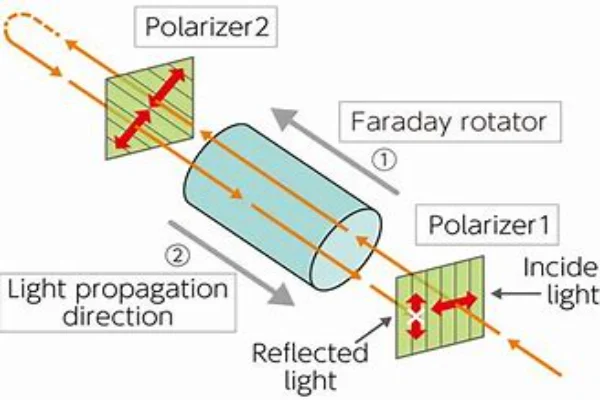
How TGG Enhances Performance of Faraday Isolators
TGG not only gives life to Faraday isolators but also elevates their performance. Its exceptional thermal conductivity helps dissipate heat effectively, enabling isolators to function reliably even in high-power laser systems.
Intensified Polarization Rotation: Boosting Isolation Efficiency
TGG’s high Verdet constant enables it to rotate the plane of polarization more effectively than many other materials. This increased rotation directly translates to improved isolation efficiency, ensuring that more undesired backward propagating light is blocked, thereby enhancing the overall performance of the Faraday isolator.
Minimized Light Attenuation: Maximizing Light Transmission
The low absorption coefficient of TGG is another performance enhancer. It ensures that the light passing through the TGG crystal within the Faraday isolator suffers minimal attenuation. This means more light makes it through the isolator, maximizing light transmission and improving the isolator’s effectiveness.
Superior Heat Management: Safeguarding Against Thermal Damage
High-power laser systems generate substantial heat, which, if not managed effectively, can lead to system instability or even failure. The superior thermal conductivity of TGG comes into play here, effectively dissipating the heat and thereby maintaining a stable operating environment within the Faraday isolator. This thermal management significantly enhances the performance and reliability of the isolator, especially in high-power laser systems.
Durability: Ensuring Long-Term Performance
The robustness and durability of TGG crystals add to the longevity of Faraday isolators. Given that these isolators are often used in challenging environments, this durability ensures that they continue to perform optimally over extended periods, providing long-term performance enhancement.
Advanced Applications of TGG-Based Faraday Isolators
Beyond their fundamental role, TGG-based Faraday isolators have paved the way for advanced applications in various fields.
High-Powered Laser Systems: Maintaining Stability and Longevity
High-power laser systems present unique challenges, including managing back reflections and effectively handling heat. TGG-based Faraday isolators rise to these challenges with aplomb, driven by the exceptional thermal properties and high Verdet constant of TGG.
By effectively managing back reflections, these isolators prevent potential damage and disruption to the laser system. Additionally, the superior thermal conductivity of TGG allows for effective heat dissipation, ensuring system stability even under high-power conditions. This dual function not only enhances the performance of the laser system but also contributes to its longevity.
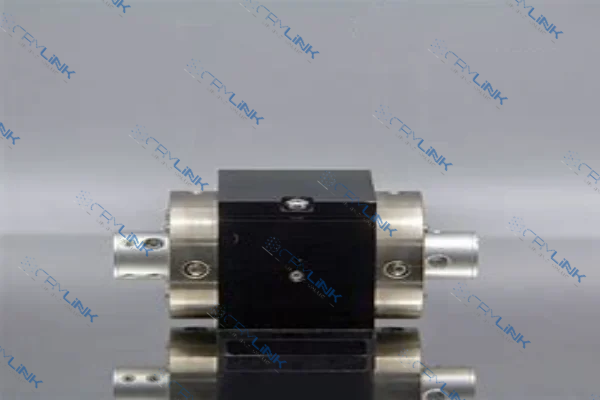
Optical Telecommunication: Ensuring Signal Integrity
Optical telecommunication systems, the bedrock of our interconnected world, also leverage TGG-based Faraday isolators. In these systems, Faraday isolators are used to maintain signal integrity by preventing back reflections that can interfere with the signal.
The high Verdet constant and low absorption coefficient of TGG ensure that the light signal undergoes minimal attenuation and retains its original quality while passing through the isolator. This functionality is crucial in optical telecommunication systems where preserving signal integrity can mean the difference between clear, reliable communication and disrupted connections.
Medical and Industrial Lasers: Aiding Precision and Safety
The use of TGG-based Faraday isolators extends to medical and industrial lasers as well. In medical applications, they are used in laser surgery systems and diagnostic equipment to protect the systems from back reflections, thereby aiding in precision and enhancing patient safety.
Industrial laser systems used in cutting, welding, and engraving also employ TGG-based Faraday isolators. They not only protect the laser sources from potential damage but also enhance the overall efficiency and safety of these systems.
Conclusion
In conclusion, the importance of terbium gallium garnet in Faraday isolators is undeniable. By virtue of its unique properties and functionalities, TGG has emerged as a game-changer in the optical technology domain. As we continue to advance, the utility of TGG crystals in the production of Faraday isolators will likely remain at the forefront, reinforcing the indispensable nature of this material.
FAQs
- 1. Why is TGG preferred in Faraday isolators?
- TGG’s high Verdet constant, excellent thermal conductivity, and low absorption coefficient make it an optimal choice for Faraday isolators.
- 2. How does TGG contribute to the functionality of a Faraday isolator?
- The high Verdet constant of TGG enables it to rotate the plane of polarization of light when subjected to a magnetic field, a principle at the heart of Faraday isolators.
- 3. What makes TGG suitable for high-power laser systems?
- TGG’s excellent thermal conductivity allows for effective heat dissipation, making it suitable for high-power laser systems.
- 4. Does TGG have applications outside of Faraday isolators?
- Yes, apart from Faraday isolators, TGG is also used in other optical devices and systems due to its unique properties.
- 5. What are the future prospects for TGG in optical technology?
- Given its unique properties and diverse applications, TGG is expected to continue playing a crucial role in optical technology, particularly in Faraday isolators.


